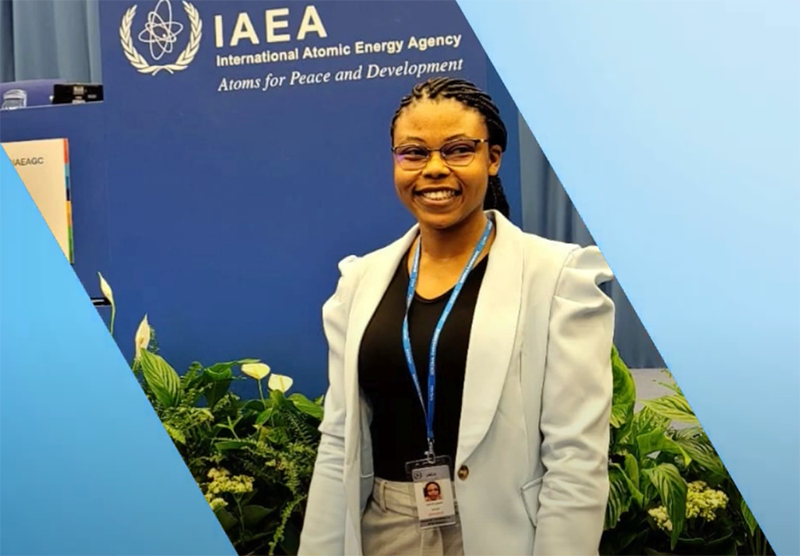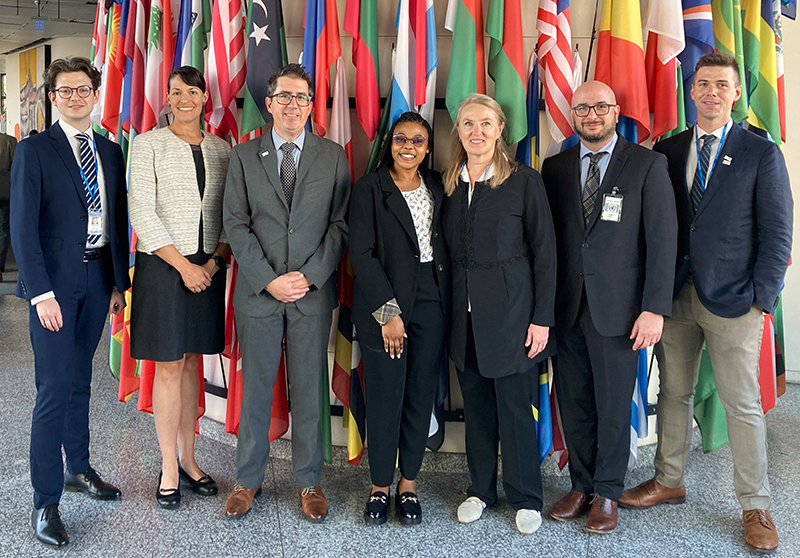- Featured
- No Comment
INTERVIEW: A Conversation with Lynette Moyo – inaugural recipient of GCNP Nuclear Fellowship

By nti.org
In September 2023, NTI and the Vienna Center for Disarmament and Non-Proliferation (VCDNP), a member of NTI’s Gender Champions in Nuclear Policy (GCNP) leadership network, launched a fellowship to bring new, diverse voices to important international fora focused on nuclear issues. The GCNP: Next in Nuclear Fellowship seeks especially to support women and individuals from the Global South.
The inaugural recipient of the fellowship was Lynette Moyo, a radiation protection officer for the Radiation Protection Authority of Zimbabwe. Lynette attended the 67th International Atomic Energy Agency (IAEA) General Conference (GC) and participated in the VCDNP’s short course on non-proliferation and disarmament.
She sat down with Scott Roecker, vice president of NTI’s Nuclear Materials Security program, during the GC to chat about her career and her takeaways after attending the GC for the first time.
First of all, I’d love to hear a little more about the work you do at the Radiation Protection Authority.
I was recruited into a two-year structured graduate program at the Radiation Protection Authority of Zimbabwe. I started off in the dosimetry department, where I was doing occupational exposure monitoring, then shifted to the inspections department, where we mainly conducted inspections of different facilities that use radiation-emitting equipment.
I recently moved to the licensing department as a radiation scientist. The department manages the national inventory of radioactive sources and oversees the authorization processes for cradle to grave management of those sources, issuing authorizations for their use, import, export, and transit.
I actually had a similar experience moving around to different jobs when I started my career in the U.S. government—it was a great way to learn and figure out what I was most interested in. What made you want to travel to Vienna for the GC?
I always thought it would take me years of professional experience to get here. When I was identified as a candidate to apply for this fellowship, I was so excited, but never in my wildest dreams did I think that I was going to get it! I knew coming to the GC would give me exposure to all sorts of experts from different nuclear technology fields that I wouldn’t otherwise have for five, ten years—maybe even longer.
These are the people I need to learn from, who have gone before me in the path that I want to take. So, my main objective in coming here was to connect with people and expand my knowledge, as that will enhance my ability to contribute to my organization now and assist me in getting to where I want to go in the future.

What was your most interesting experience at the GC so far?
I really liked the ambiance of the plenary session on Monday morning. There was a mix of people in the room and you really have no idea who you’re standing next to, so that was a very exciting experience. I also enjoyed the side event hosted by Women in Nuclear (WiN) and the IAEA on gender equality, inclusion, and diversity. It’s not easy being a woman who’s trying to balance a career in this field with so many other things.
I agree, the energy when things kick off here is something special! What would you like to have seen more of at the conference, either from the IAEA or from member states?
I appreciated the member states’ exhibitions and would love to see even more countries showcasing their current work to mitigate climate change and promote the different Sustainable Development Goals, so countries can learn from each other as they implement similar steps. I’d also love to see countries showcase collaborations with other countries or organizations that facilitate the exchange of ideas, foster cooperation, and encourage joint projects on different areas of nuclear technology.
Diversity is an area where I think member states and the IAEA can both grow. Member states could get a better variety of perspectives and experiences at their side events by inviting more people from underrepresented groups to participate. The IAEA can help here by offering scholarships and mentorship initiatives that bring underrepresented groups, women, youth, and people from developing countries to the GC. Coming from the Global South, we don’t have much exposure to issues like disarmament and non-proliferation, safeguards, and the technical aspects of verification, so to have the opportunity to participate in an intensive course on all these issues is something that would be so beneficial—it certainly has been for me!
What do you hope to be able to take back from this experience to your work in Zimbabwe?
There are certain side events here on topics very relevant to what I’m working on that I can learn from. For example, the launch of the Regulatory Authority Information System upgrade (RAIS+). We’re currently using RAIS but will move to RAIS+ in November, so by being here I can get firsthand information about it and hear ideas on how we could implement and incorporate it in our system.
Also, as we plan to launch our WiN-Zimbabwe Chapter later this year, I’m hoping to get recommendations on programs and plans we can put into practice to involve women in the nuclear technologies field in Zimbabwe.
It’s fantastic that you’re finding such practical ways to translate what you’re learning here to your work at home, in addition to expanding your network and knowledge on all these issues. You mentioned that coming to the GC had felt like something that was many years away. Now that you’re here, where do you hope to go next in your career?
I’ve been very interested in safeguards inspections and verification recently. Being here and expanding my knowledge on nuclear security, safety, and non-proliferation issues is fueling my desire to contribute to peaceful uses of nuclear energy through IAEA safeguards. But I also think that as much as I’ve been interested in safeguards, I’m open to my trajectory changing. For example, because of what’s going on in global affairs, I’ve been thinking about the differences between peacetime versus wartime inspections and verification, and what procedural changes or technical differences there are in each scenario.
That sounds fascinating, and I wish you the best—wherever your career takes you! We could not have asked for a better recipient for this fellowship.
Thank you!
